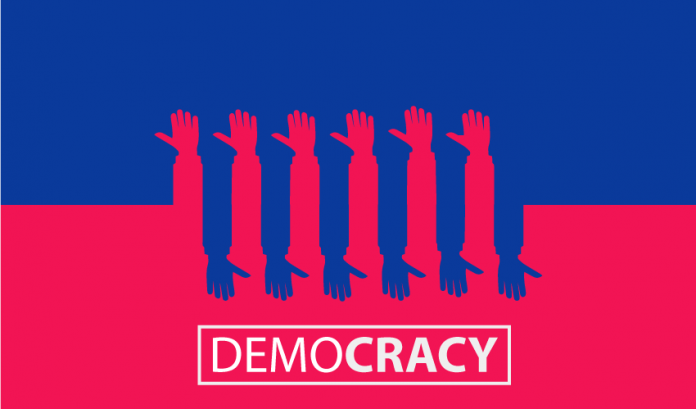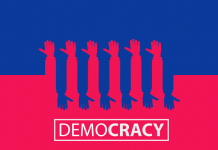This article is written by Sneha Mahawar from Ramaiah Institute of Legal Studies. The article discusses the challenges, shortcomings, and weaknesses present in Indian democracy. It also lays down the corrective measures which can be undertaken to overcome such challenges, shortcomings, and weaknesses.
Table of Contents
Introduction to democracy
The word Democracy is derived from the Greek term ‘Demokratia’ which means Rule of the people. It can be further sub-divided into two words: Demosmos and Kratos, which means people and power respectively. It is especially a form of government either directly or through elected representatives of the people. It is a government under the direct or representative rule of the people of its jurisdiction. In 1918, Charles Horton Cooley described democracy as a belief in political freedom and equality.
In simple terms, democracy is when the citizens of a nation have the authority to choose its representatives. Democracy is also termed as the “Rule of Democracy”. In a democracy, powers cannot be inherited. In a democratic country, the citizens elect their leaders for which the representatives stand in election and citizens vote for them, thereafter, the representative with the highest number of votes comes into power. Thus, in a democracy, the power lies with the people.
However, the present age democracy is not limited to political democracy. It means more than a mere form of government. In its comprehensive form, democracy means, or ought to include a form of government, a type of state, a pattern of the social system, a design of economic order, and a way of life and culture.
Therefore, when it is said that India is a democratic nation, it does not mean that only its political institutions and processes are democratic but also that the Indian society and every Indian citizen is democratic, reflecting basic democratic values of equality, liberty, fraternity, secularism, and justice in the social environment and individual behavior.
Indian democracy
India is a proud country as it is recognized for having the largest democracy in the world. India achieved the status of being a democratic nation post its independence in 1947. Thereafter, the citizens of India were given the right to vote and to elect their leaders. Indian Constitution guarantees its citizens the right to vote irrespective of their caste, color, creed, religion, and gender. It has five democratic principles – sovereign, socialist, secular, democratic, and republic.
Our country has witnessed more than 65 successful elections, peaceful changes of government at both the Centre and in the States, people exercising freedom of expression, movement, and religion. Now, India has also been developing and transforming economically and socially. As it is already known that democracy means “government of the people, for the people, and by the people”. It means democracy is not limited to just a process of election, but also fulfilling the social and economic aspirations of the people. In India, there is a regular debate on various aspects of democracy and its achievements and challenges.
Challenges of Indian Democracy
Illiteracy
Illiteracy has been a major challenge for India’s democracy since the independence of the country. It has been a challenge because both the education level of its people and the socio-economic development of a nation play a vital role in achieving success in a democratic nation. At the time of independence, the literacy rate of India was almost dismal, and the female literacy rate was negligible. Due to these conditions in the country, many fear that citizens will not be able to play their part effectively and exercise their right to vote meaningfully which, in a democracy, is the main power of the people. However, the Indian electorate proved this apprehension wrong over the years by participating in elections in record numbers and casting their votes. Literacy is a necessity in any nation not only to enable its people to participate in elections and exercise their right to vote meaningfully but also to enjoy dignity in society.
Poverty
Poverty is regarded as one of the biggest challenges in the way of the successful functioning of democracy. A hungry person least cares about his right to vote and all he wants is food to fill his stomach. India inherited the state of poverty since the colonial rule of the Britishers. Till date, some people belong below the poverty line in our country. Poverty in India still exists because of various reasons such as unemployment, and under-employment. The population of our nation is increasing day by day and the scope of employment is decreasing. The process of economic development has not been able to ensure social justice and bridge the gap between rich and poor. These are the reasons why poverty continues to remain a great challenge to Indian democracy.
Gender discrimination
Although gender equality is a basic principle of democracy in India, gender discrimination exists on every small step. Our Constitution guarantees equal treatment to all citizens, irrespective of their gender. Our fundamental rights, as well as Directive Principles of State Policy, makes this crystal clear. But the discrimination against females continues to be a fact of life. Certain examples include the abortion of a girl child due to which female child ratio is decreasing. Another instance is that the Women Reservation Bill is still pending in Parliament. This bill proposes to give women 33% of the seats in Parliament, allowing them to participate equally in politics. Although most of the members agree on the need for such a Bill, none of them has given it a priority.
Casteism
Casteism is a differentiation made between individuals based on birth. In India, the caste system originated on the arrival of Aryans and continues in some parts of the country. This system further brought in practices like untouchability which continues despite being banned. Due to this system, segregation was made between lower castes and high castes. The lower caste people were deprived of basic education, social benefits, and treated illy. All they were allowed to do was menial labor and were treated as inferiors. It played a negative role in the development of democratic political development as lower caste people are in minority and are used as vote banks by politicians.
Although it is not conjectured that India has had a caste system since time immemorial, it is high time that such a system is eradicated. It is a challenge to eradicate the caste system from the country so that it does not stand in the way of democracy.
Communalism
Communalism is an ideology which states that society is divided into religious communities whose interests differ and are, at times, even opposed to each other. Communalism is a setback to the Indian democracy as it acts as an offense to secularism. Often, communalism is wrongly used as a synonym for religion but in reality, these are two different terms. It is disruptive to our democratic system. It is a terminology that is used to make an attempt to divide people into different groups based on religion, communities, etc. to incite strife among them.
Religious fundamentalism
Religious fundamentalism is a term that enforces communalists in the exploitation of religion, and politics. It is an ideology that helps in the growth of orthodox society and strict obedience, submission to principles of religions. Religious Fundamentalism opposes the progress of a nation and establishes control over various communities of the society.
Regionalism
India is a nation with diversities of religions, languages, tribes, cultures, and communities. Due to such diversities, imbalances occur in the development process and lead to regional disparities, the democracy of the country is suffering. It is a true fact that the aim is to develop all religions but imbalances remain. The problem relating to regionalism begins when the different political parties use it for their political gains. Such regional discrimination, deprivation, etc. attacks the democracy of a country.
Corruption
Corruption is a major problem in India as it has its roots in every field be it land, health, education, property, industry, transport, agriculture, armed force, spiritual pursuits, and even religious institutions. It exists at all levels of politics, bureaucracy, government, and corporate. As citizens of the country, we should take measures to eradicate corruption in every possible manner.
Criminalization of politics
The Criminalization of politics is when the politicians undertake criminal actions to win elections. The criminalization of politics has become a very sensitive and debatable topic in recent years. Many politicians are dissatisfied with the principles of democracy and undertake undemocratic methods to win elections. Such actions are a major threat to the successful functioning of democracy. Being an Indian citizen, one shall take the smallest possible step to discourage such undemocratic activities and ensure no person from a criminal background stands for elections.
Political violence
Violence is of various forms namely, communal, caste, political, etc. Whenever a political party loses elections, its party members begin engaging themselves in violence. It is a threat to our democracy because it leads to aggressive competition for political power and the victim is always the general public. For instance, we can refer to the post-poll violence in West Bengal in April 2021
Weakness and shortcomings of Indian democracy
- In India, women constitute 50% of the total population. But in State assemblies and Parliament, they do not even enjoy complete 10% representation. It is no surprise that topics like rape, domestic violence, etc. are not dealt with as an urgent matter of discussion.
- Tax is paid by only 1% of the total population in a nation of 1.24 billion people. However, 15% of the population is liable for paying taxes.
- India is a country of 28 states and 8 union territories with a population of 124 crore people with numerous languages. Whereas, the United States has 50 states for a population of 34 crore people.
- Approximately 60,000 cases are pending in the Supreme Court, 42 lakh cases are pending in different High Courts, and 2.7 crore cases pending in District and Subordinate Courts. There are not enough judges and it has a faulty, and slow justice system.
- GDP of our country has increased about 50% but children below the age of 5 years are still malnourished.
- Currently, more than 260 million farmers are protesting against the farm bills enacted but the farmer’s protest is continuously failing Indian democracy as no decision has been undertaken on the government’s part.
- People of our country are still living in poverty, illiteracy, and unemployment.
- Approximately 60% of the total population has no access to sanitization.
- Institutional changes do not accompany economic development.
- Approximately 35% of the total population lives in poverty.
- There is not even 6% women representation in governance.
- Our society clutched into socio-economic inequalities.
Role of citizens in a democracy
Participation
In a democratic nation, the citizen’s role is to take part in public life. The most common role of a citizen is to exercise its right to vote. To exercise this power, a citizen must be aware of the different political parties, their candidates, their propaganda, etc. Although the illiteracy rate is very high in India, the Election Commission does best on its part to make people realize the importance of taking part in elections.
However, in democracy participation is not limited to an election it also involves active membership in non-governmental organizations and represents various groups of society such as women, farmers, students, doctors, businessmen, teachers, etc.
Making the system accountable
Mere participation in elections by citizens of a country is not enough in a democracy. Citizens have to make efforts to make the system of democracy responsible and responsive. The citizens must make the Parliamentarians, Members of State Legislature, and their representatives in Panchayati Raj and Municipal Institutions accountable for their actions.
The Right to Information Act, 2005 has been enacted to enable citizens to play their role effectively. The citizens have the right to be informed about any public policy and issues and know about the use of their funds. If any government is not fulfilling its promises then the citizens can point to it via media, make recommendations, etc, and hold them accountable for their actions.
Fulfilling obligations
Lastly, every citizen should have a realization that they have many more obligations to fulfill other than voting. Democracy is not a system where anything can be done, it is a system where citizens have various freedoms but never absolute. It is based on the principle of “with rights comes obligations.”
Recent reports on the health of global democracy
Recently, two reports have been released on the health of global democracy. These reports project India’s political trajectory.
1st Report
After the 1990s, it is for the very first time that the pro-democracy nonprofit Freedom House has downgraded India’s status. This house has reviewed India as “Partially free from Free”, on the grounds of the country’s weakening protection of civil liberties.
2nd Report
In this report, India was reported as a country that no longer is eligible and qualified for “Electoral Democracy” by the Varieties of Democracy Institute. The reasons behind the production of such a report are the consolidation of a Hindu-majoritarian brand of politics, the excessive concentration of power in the hands of the executive, and the clampdown on political dissent and on the media.
Conclusion
Hence, democracy is a mirror where one can clearly see the truth but the mirror also serves as a door to that darkroom just behind it where our chosen representatives are free to take decisions to serve their personal interests to acquire power and property of the people in the name of the people. The representatives are doing so by continuously hammering the minds of its people with their own dreams and desires through promises, planning, theories, concerns, inquiries, and commissions that ultimately take the images on the mirror of democracy as our own, painted by our rulers in the disguise of servants. However, this scenario can be changed if the citizens take effective participation, fulfill obligations, and hold public authorities accountable for their actions.
References
- https://www.europarl.europa.eu/thinktank/en/document.html?reference=EPRS_BRI(2020)651915
- https://nios.ac.in/media/documents/SecSocSciCour/English/Lesson-23.pdf
- https://www.quora.com/What-are-the-main-drawbacks-of-Indian-democracy
- https://www.financialexpress.com/opinion/are-indian-democracys-weaknesses-inherent/1591853/
- https://ask.learncbse.in/t/what-are-the-shortcomings-or-weaknesses-of-democracy/22401
- https://www.studyrankersonline.com/29494/what-are-shortcomings-or-weaknesses-of-democracy
- https://theaggie.org/2020/12/23/farmers-protests-highlight-indias-failing-democracy/
- https://www.foreignaffairs.com/articles/india/2021-03-18/decay-indian-democracy
- https://www.toppr.com/guides/civics/what-is-democracy-why-democracy/democracy/
LawSikho has created a telegram group for exchanging legal knowledge, referrals, and various opportunities. You can click on this link and join:
 Serato DJ Crack 2025Serato DJ PRO Crack
Serato DJ Crack 2025Serato DJ PRO Crack











 Allow notifications
Allow notifications


